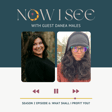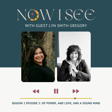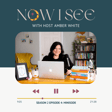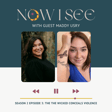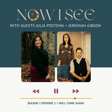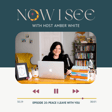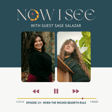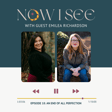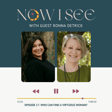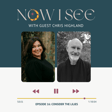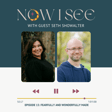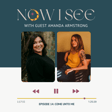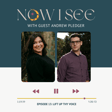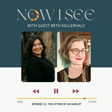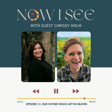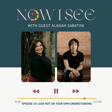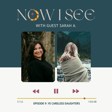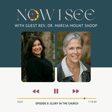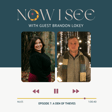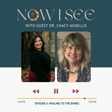Become a Creator today!Start creating today - Share your story with the world!
Start for free
00:00:00
00:00:01

The Heart of the Prudent: Giving Up God with Sarah Henn Hayward
There are a myriad of reasons that people leave their faith, and most of the time (at least on this show) it’s pretty traumatic. But not everyone leaves after heartbreak or abuse. Sometimes, it just makes sense to someone to walk away.
Our guest for this episode, Sarah Henn Hayward, made just such a decision. Sarah is the author of Giving Up God: Resurrecting a Spirituality of Love and Wonder. Together, we discuss her decision to leave, how it has impacted her family relationships, how she navigates an interfaith marriage, and whether or not she would do it all again.
More from Sarah:
Links
Transcript
Introduction to 'Now I See' Podcast
00:00:01
Speaker
I was lost in utter darkness I was trapped in toxic shame I was bound by my religion Till I chose to break away
00:00:24
Speaker
Now I'm finding my true colors For the first time I feel free Now I'm learning self compassion And as I heal I'm finding peace
00:00:51
Speaker
Welcome to Now I See, eye-opening stories from the formerly faithful.
Guest Introduction: Sarah Hen Hayward
00:00:56
Speaker
I'm your host, Amber White, and here, me and my guests share our experiences in loving and leaving rigid faith systems. Together, we shine a light on the dark corners of these institutions and share the joys of rebuilding life on our own terms. I promise you'll leave inspired, even if you are a little teary-eyed.
00:01:23
Speaker
Hi, and welcome back to Now I See. I'm your host, Amber White, and today I'm talking with guest Sarah Hen Hayward. Sarah is the author of the book, Giving Up God, Resurrecting a Spirituality of Love and Wonder. Sarah is a writer, a voracious reader, a deep thinker, a curious learner, a nature lover, a brave adventurer,
00:01:51
Speaker
and Enneagram 7, a former Christian, a doctor of physical therapy, and a little friend. Her blog at SarahHennHaward.com highlights the books of marginalized communities, and she is active on Instagram as at SHawardRights. Hayward is the author of Sedona and the Sloth, Cape Critter Series number one. She lives in Spokane, Washington with her husband Dan and her two children.
00:02:21
Speaker
You can find links to her website, Instagram, and giving up God in the show notes.
Sarah's Faith Journey
00:02:28
Speaker
I'm excited to share this episode with you listeners because this is the first time we've had someone on the show who decided to leave their faith simply because. Sarah is also in an interfaith marriage and we talk about her and her husband's approach to this as a couple and as parents. Sarah's story is
00:02:51
Speaker
full of delightful surprises, and I hope you enjoy this conversation as much as I did. Alright, let's get into the episode.
00:03:13
Speaker
Hi, Sarah. Thank you for being on the podcast today. I am so excited to have you. I have thoroughly enjoyed reading your book and I think our listeners would enjoy it too. So thank you for being here to share your story. Thank you so much, Amber. I'm happy to be here.
00:03:30
Speaker
Yeah, so I'd like to start us off by having you tell our listeners a little bit about the faith that you come from, what you were deeply immersed in and what that was like for you and your connection to it.
00:03:44
Speaker
OK, sounds good. Yeah, so I grew up very immersed in an evangelical free church, which I have learned since getting into this deconstruction world more that the evangelicals are a little more centrist.
Questioning Faith through Writing
00:03:58
Speaker
Looking back at my life, I had thought I grew up really conservative, but I didn't realize how far it goes.
00:04:04
Speaker
So yeah, I grew up evangelical, and from the day I was born, we were in church. I did Awanas, youth group, retreats, mission trips, which I now cringe at, just all the things. Yeah, Bible studies. My church was really big on emphasizing quiet times, and so
00:04:24
Speaker
That's actually where I started writing a lot. I used to journal daily and kind of did that as a way to pray, but also process life in the world. And that's one thing I'm grateful for, looking back that it unlocked that writing piece of me. But yeah, I grew up evangelical and didn't really examine my faith as kids kind of, you know, just absorb what they're taught and given until I got to college. So all through high school, I was pretty
00:04:53
Speaker
rigid, pretty close minded. I didn't think that, you know, Catholics were real Christians. I thought being gay was a choice and that they were doomed to hell. Like all these things that I kind of just picked up to the osmosis. I don't think my church was particularly
00:05:10
Speaker
um, vile or like hateful in their sermons. We did, I don't remember a single sermon against homosexuality or anything like that, but it was more just the only time they would talk about relationships were heterosexual or, you know, it was clearly not an okay choice to make, but it also wasn't maybe overtly, you know, slammed in, in church, which is something that I realized looking back was a mercy.
00:05:37
Speaker
So I actually had a pretty, I would say healthy relationship with religion and with God growing up. My church didn't emphasize the original sin kind of you're a piece of shit doctrine. I knew I needed a savior and I knew that I was a sinful person, but I believed it when I was told that if I
00:05:58
Speaker
asked Jesus to come into my heart, he would purify me and make God be able to love me. And I didn't analyze that deeply to think, I guess I was unlovable before that, but I felt loved by God. I felt like the God of the universe knew me, knew me personally, cared about my life, was invested in what happened to me. And that gave me a strong sense of worth and of value.
00:06:25
Speaker
and of purpose. God really directed my life for a long time and was a strong factor, if not the number one factor in a lot of my choices, from relationships to even the clothes I wore and the movies I watched, all that kind of thing.
00:06:43
Speaker
my faith with God was fully integrated into my life in a way that felt good to me, you know, at the time. And so I feel very fortunate. I don't have a traumatic story. You know, I know there's so many people that the church has just abused and beat up and treated horribly. I happen to be a straight white woman, so it's not
00:07:10
Speaker
Not a lot of low-hanging fruit for the church to knock me down on. I fit the mold. But yeah, so I had a pretty good relationship, honestly. And then my faith sort of diverged and just started to evolve as I went out on my own in college.
00:07:30
Speaker
meeting more people, learning about the world, seeing, I went to a Jesuit school, Marquette University, which is heavy into social justice. So seeing more suffering in the world and learning about kind of how bubbled off my life had been up until that point was
Understanding Free Will and Faith
00:07:48
Speaker
eye opening. And so that
00:07:50
Speaker
drew me into a much more progressive faith. I became more politically active and in a liberal bent, and my faith got more and more open minded. Over time, I became fully affirming of LGBTQ plus culture. I
00:08:09
Speaker
stopped believing in hell as a place of eternal torment. I accepted evolution as fact. I still thought God set off the Big Bang maybe or was involved at some level, but was able to realize
00:08:22
Speaker
science is pretty sure this is how it works, so okay, I'll believe it. And so I still felt very much a Christian and a part of the church family, but just now in a more kind of progressive open-minded way. And it wasn't until, I would say, you know, at the time I never thought
00:08:46
Speaker
I was moving out of faith. I just thought my faith was growing and that I was thinking deeply and asking questions and analyzing things and reading books. So I didn't see it coming that I would be where I am now, which is an agnostic atheist, highly doubtful that there is a higher being, but open to admit that I'm not totally sure.
00:09:07
Speaker
And I would say that that final push kind of came within the last four years during the pandemic and after the George Floyd murder and all the racial tension had really gotten heavy again. And just thinking about kind of that old question of good and evil and suffering
00:09:25
Speaker
I used to always use free will as an excuse to let God off the hook there saying he had to protect our free will. But the more I kind of learned about free will and the neurobiology behind that, or even just the fact that is it really free will when there are so many options not available to so many people, that excuse fell apart. And that was really the big unraveling for me. And I thought,
00:09:51
Speaker
I can't believe that there's somebody out there who did this knowing what it would be like and could be called love. So either God is not very loving and I don't want to worship that thing anymore or they're just, they were never there to begin with and we're all just here because we're here as a byproduct of evolution.
Intellectual Path to Agnosticism
00:10:10
Speaker
So that's kind of where I've landed now for the whole big picture. I love that you talked about being in college and that's kind of where things started as you were learning more about the world around you. It was definitely a huge factor for me too. Getting to see anything outside of the bubble that I was wrapped up in was a big deal for sure. But I liked something you said in your book early on. You said that your departure from the faith was more intellectual than personal.
00:10:40
Speaker
And I thought that was really neat because for the listener's sake, a lot of the book, you talk about the things that you learned and read and analyzed and share your process in depth. And it's really beautiful to just see that journey kind of unfold through the books you are reading and the people that you met in Australia and the experiences that you had in Australia.
00:11:05
Speaker
I just resonated with so much of it, but also just could feel that wanting, right? Like that wanting to know and to learn, but also that fear that the more I do this, the further I'm gonna get from this beautiful thing that's held me together so far. Your book really just lays that out so beautifully. Thank you.
00:11:32
Speaker
Yeah, I also liked there's another thing I wanted to touch on because it comes up a lot. They're like, oh, people deconstruct because they never took their faith that seriously. To me, it's the opposite. Most of the people who deconstruct are the people who took it the most seriously and were very rigid in it and very concerned about doing things the right way.
00:11:54
Speaker
And you said, it was precisely because I took my faith so seriously and obsessed over it so much that I eventually asked too many questions, ventured way out to where the ice was then, and fell into the abyss. That's such a beautiful representation of what happens. That is what it feels like.
00:12:18
Speaker
Yeah, I used the analogy in the book as I go through kind of each major issue that fell apart is walking out onto like a frozen lake and starting to hear the ice beginning to crack and then starting to see some cracks and then starting to see water slipping through the cracks and how scary it felt, you know, that sense of the ice is going to shatter beneath my feet and
00:12:44
Speaker
there was a sense of fear of, gosh, do I want to know the answers to some of these questions, especially as they got really heavy. But I think you're right. A lot of us that deconstructed it's because we actually believed what we were being told. And if you take some of the faith statements seriously,
00:13:04
Speaker
and follow that through to its conclusion, you know, if we're really saying that God is all-powerful and all-knowing and love, how does that work? Or just, you know, a lot of the different claims, if you really push on them and just keep digging and digging, they kind of just fall apart. So I just, yeah, I believed what I was taught, and as I thought about it and
00:13:28
Speaker
thought about the consequences and, well, what does that mean about, you know, these people? And yeah, just because I was so, what's there's that verse about ruminating over scripture day and night and like, I would, you know, I was doing that. And that's part of what led me away. And I was, I wanted to share that story because I feel like there's a lot of books out there now of people who have left the faith.
00:13:53
Speaker
And everyone's story completely deserves to be heard. A lot of them tend to be people that had those really traumatic, horrible things happen. And it's odd that they would want to burn the whole church down. And I get that. That wasn't my story. And I just had a hunch that there was others out there like me that weren't abused by their pastors or brought up to be
00:14:14
Speaker
shamed in front of the whole congregation or had something really horrible happen, but who just sort of thought their way out. And so I wanted to put that story out there into the universe for folks in a similar boat so that they could see that they weren't alone. Yeah, so I'm glad it resonated with you.
00:14:33
Speaker
Yeah, it felt good to read. It felt, you know how it is when you meet somebody who's been through a similar situation as you and you just feel that resonance and that it felt very good to read. And I'm very glad to have a copy of it myself. I'm curious what your family's reaction was to you starting to kind of question things, step away from the faith a little bit. Did you talk to them about
Family Dynamics and Belief Changes
00:14:58
Speaker
it? What was that experience like?
00:15:01
Speaker
Yeah, my parents have always, since I was born, have always been religious, but we never really got heavy into like family quiet times or devotions or it was sort of left. We all went to church together.
00:15:16
Speaker
But outside of that, we weren't like sitting around the dinner table talking about God or talking about suffering in the world. I think both of my parents, I think it's healthy, they actually just try to live their life and kind of go about their day to day business and
00:15:32
Speaker
take care of the need in front of them. They're both involved in various areas of service and I think they just try to put their faith into action and they don't think about it a whole lot, which is fine. And it's for them, that's a good way to live and it's making them good people who care about others, which is great.
00:15:49
Speaker
We never sat around and talked about a lot of things, so they were aware that I was changing. They definitely knew probably more from that political angle of it. They knew that I no longer thought homosexuality was a sin, or they knew that being in Australia where I had met a lot of Muslim friends and
00:16:11
Speaker
and questioned how they could be doomed to hell just for being born in the wrong place basically. I became more universalist and they might have been vaguely aware of that. I think they just took it in stride. I've always been a bleeding heart even when I was a conservative. I think it was in there all along. And so I don't think they were shocked. My mom at one point in time thought I would like move abroad to go do peace corps, you know, stuff like that.
00:16:38
Speaker
They weren't totally rattled. It wasn't until recently when I was really starting to question the whole picture and the existence of God itself that they got freaked out. So they are not
00:16:54
Speaker
excited now. And they're not very happy with where I'm at. They have actually read the book. And yeah, they both read it an early version of it and then bought a copy when it came out. My mom is even going to read it with her Bible study group at church, which I haven't heard if that's happened yet. But I think they
00:17:15
Speaker
they're able to step back. Their faith is important to them, but I'm more important as their daughter. And they're able to see that. Yeah, I feel lucky. Yeah, I know that's not the case for everybody. So they're able to compartmentalize that a little bit and set our differences aside in order to preserve a relationship. So
00:17:37
Speaker
That's kind of a right now it's definitely kind of an elephant in the room. Whenever something happens at my mom. Just the other day, a mutual friends when we grew up with got diagnosed with a really aggressive form of cancer and she's telling about it and she's like,
00:17:53
Speaker
I know you don't believe in God or prayer anymore, but I, I'm praying for him and I think it helps, you know, just little comments. I'm like, I will still pray for him. I'm not praying to God, but I'll think of him and wish him well for whatever good that does. I don't know, but you know.
00:18:11
Speaker
I'm not a monster who doesn't care about what happens to people anymore. Right, I will still send my best wishes and hope for peace and kindness and goodness. And I actually will use the phrase, I'm praying for people still because I think
00:18:30
Speaker
that conveys what I mean. I am holding them in my heart. I am concerned for their wellbeing. I'm wishing them well. So I make it a semantics thing and say, well, I'm not praying to God, but I'm praying for you. And I still think that, yeah, kind of conveys what I'm trying to do. Especially if that's a term that resonates with that person too, that's a very thoughtful
00:18:55
Speaker
and kind approach. That's neat. Right. So yeah, so my parents and I are, we're figuring it out and just sort of, I'm sure they're praying for me every day that I will change my ways and come back to the fold.
Evolving Values and Marriage
00:19:10
Speaker
But
00:19:10
Speaker
Um, honestly, the further I've been out of belief, the less and less I think, oh, I don't know. It's, I look backwards now and think, gosh, how did I ever believe some of this stuff? I feel like I'm getting even further away, but now you're also married. You have a lovely little family and you met your husband while you were still pretty immersed in the faith, but starting to question.
00:19:39
Speaker
Yeah, I met him after college and after grad school. And so I was a very progressive Christian already by that point. And so is he. So thankfully, the style of faith that we met under and that we both held, he already didn't believe in hell as an eternal place of torment. He was already affirming. He has a brother who's gay, so that had really made him question some of that theology.
00:20:08
Speaker
He's actually even more critical of the church than I ever was. He really hates a lot of the hypocrisy and the double speak and just how Christians will say one thing and do another with their life. So he sounds even more angry than I do if we're talking about religion in the church that was always able to separate. Well, that's not God, that's the church and they're flawed.
00:20:34
Speaker
But yeah, we met definitely as Christians, and that was part of our connection, I would say. And we both would have said at the time we would not have married somebody who wasn't a Christian, you know, that equally yoked piece. So that has been a shock for him to now be married to someone who is not a Christian.
00:20:56
Speaker
and not even believe in a higher being at all. So yeah, that's been a huge stumbling block or just piece of disconnect for us to now have to deal with.
00:21:09
Speaker
Yeah, I bet, especially if it was such a big part of your relationship before. Yeah, you know, we both would have said that we were trying to put God's will first and live our lives in a way that was what we understood Christians to be, you know, countercultural, kind of the message of Jesus, which was very like,
00:21:26
Speaker
socialist, really, you know, taking care of the poor and the least of these. And we were trying to do that. And so I think, you know, it's interesting, I feel like I'm still very much the same person who just doesn't happen to believe in God now. I still value all those things. I still want to relieve suffering in the world. I still feel connected to the human family and aware of the fact that
00:21:54
Speaker
I'm not free until everyone's free, you know, that sort of collective suffering hurts us all. And so I still value almost all the same things, generosity, humility, service, I just am coming at it from a different angle now than he is. And
00:22:12
Speaker
I think it was hard for him. He grew up so ingrained to think that you need God to be a good person, right? Like we were taught that God gives us that sense of right and wrong and morality. So it's almost like it's hard for him to believe that I still really do care about all that stuff.
00:22:32
Speaker
without having God lurking over my shoulder, making sure that I'm living the right way and doing the right things. So I'm trying to show him like, yeah, no, I still want to be a good person. I think it's a good way to be a human and a good way to make the most of my life.
00:22:51
Speaker
not to be selfish and greedy and all those sinful behaviors that we were warned against. We're redefining some things and trying to figure out a new common ground.
00:23:04
Speaker
Yeah, that's good. We had talked before, you mentioned that you two just take time to kind of talk about it and listen to each other and make that space in your marriage, because this has been a few years now that you've been kind of on a different wavelength where faith is concerned. And I'd love to hear more about some of the things that you guys do to kind of bridge that gap for each other.
00:23:34
Speaker
Yeah, so a big bridge, I would say, is the fact that I still go to church. We attend church as a family. And if I was a single person, I would not still be going to church. That's definitely an olive branch for him. It's easier because my church was also very progressive and open-minded and not black and white and open to doubt. My pastor has also read my book.
00:24:04
Speaker
and didn't kick me out of church after reading it. He enjoyed it and thought it was asking some good questions. He and I had met several times before I got to the point of falling through the ice, so to speak, and so he knew all the doubts I was having.
00:24:25
Speaker
He understood. He's like, yeah, you know, I've definitely asked a lot of those same questions. And I think he's sort of of the camp, kind of that Rachel Haldevan's like, Jesus is someone I'm willing to be wrong about. It still seems like a good way to live, even if it all turns out to be fake. You know, I think that's sort of the attitude of a lot of people at our church. So it's not super triggering to go there. And we don't go every single week. We haven't for years since really having babies because
00:24:54
Speaker
someone's always sick. Or something, you know, we travel on the weekends and other things come up. So we're not like super attenders every week. But yeah, so that's one sort of compromise. I think we tried to
00:25:11
Speaker
not harp on it. We don't talk about God or the eternal things on a super frequent basis, but then we do make sure to check in. Often it comes up. Sometimes something will happen. If there is a sermon that we attend and I don't really like what they said, we might talk about it afterwards.
00:25:32
Speaker
So, how can you really think that this holds still or, you know, so that'll bring up conversations. We've had some sad stuff happen to people around us. One of our actually church family members, the husband had gotten cancer and just died, you know, and our wife and three kids are alone without them. And so talking about death and things like that will bring up our differences and we'll kind of talk through that.
00:25:59
Speaker
So it comes up here and there sort of just organically. We don't have like a weekly check-in time on the calendar necessarily. And I think we try purposefully in the meantime to set that aside and recognize that although our faith was a huge reason why we
00:26:18
Speaker
let ourselves fall in love and get married, you know, like that piece had to be in the puzzle. That's not the reason we ever loved each other. I don't just love him because he was a Christian. And yeah, so I think we're trying to focus on
00:26:33
Speaker
what else we have, which is a lot. We get along really well. We're friends. We share a lot of interests. We both like to read and talk about things. And so I think we're trying to focus on those other commonalities that we have and recognize that while faith had been a pretty crucial part of our lives, it wasn't the only reason we were together and kind of bringing into those other reasons has been helpful.
00:26:58
Speaker
I'm glad. Has anything come up with the kids? Like when you guys are talking about what you want to teach them or maybe questions they've asked, I'm curious how that goes.
Discussing Faith with Children
00:27:09
Speaker
Yeah, I will own that I'm being a little wimpy there. I'm scared to fully rock that boat. Yeah. And I think that's probably the last piece that my husband's still scared of is
00:27:24
Speaker
He and I both grew up with such that strong faith that gave us so many of our values. And I think he's afraid the kids are both kind of, I have a daughter and a son and they're both mommies kids. They still come to me for a lot or would prefer to stay home with me if we're going different ways for the day. And so I think he's afraid that if I flat out tell them that I don't believe in God, that they'll both immediately be like, why not either?
00:27:53
Speaker
And I don't know, I go back and forth because they're so young, we're not raising them with a toxic faith. We keep it very basic. God knows you and loves you and you are good. Like we don't really get into a lot of dogma or you know, we hadn't even been before. So I don't think that letting them think God is real is harming them per se.
00:28:21
Speaker
So I'm even a little hesitant to necessarily take that away from them, or at least until they're old enough to really think through it themselves. They're still at an age where the world is pretty black and white, and they're not able to think in gray and in nuance, just developmentally, their brains don't do that yet. So yeah.
00:28:39
Speaker
I'm kind of holding back. I just sort of dodge it when it comes up with them. My son lately is really into, he wants to know how things work. So he's always asking like, how did this get made? Did God make this couch? Or he'll ask all the items in our house, did God make our piano? I'm like, nobody, that was made in a factory. Well, then what did God make? So I'll kind of be like, well,
00:29:03
Speaker
people think God made the world. So kind of say people think or I don't say it like I'm so certain about it, but I also don't tell him, well, I don't think God made any of this. So I'm sort of tiptoeing around it for now. But yeah, we had already been and continue to be careful about not laying into a whole lot of dogma with the kids at all and just keeping it very, very basic. So
00:29:30
Speaker
Yeah, the day will come, especially my daughter's the older one, and she reads a lot. And so she can read anything she picks up. So if she comes across my book, which there's copies in the house, she's gonna have questions, you know, so I don't want to lie completely to their faces, but I also want to respect. I don't know. Yeah, that's been a tough one to navigate.
00:29:53
Speaker
I bet. It sounds like a good compromised approach though. You're not, like you said, you're not indoctrinating them with dogma. You're taking a gentle approach. You're letting them be inquisitive. I think it sounds like you guys have come to a nice compromise on how to do that overall, which is really nice. I can see that being, especially you mentioned earlier when we were prepping for this that you were lucky that your husband's not a fundamentalist and that is so true. I think if he were, you'd be in a very different
00:30:22
Speaker
Oh, totally. Yes. He's not like, we need to be praying for forgiveness from all of our sins. You know, it's not that shame, fear-based faith at all. So that definitely helps. I like hearing that because I think it's really important to remember that there are a million ways that deconstruction can look like a lot of different things. It can be a lot of different things and it can have a lot of different outcomes. This is a possibility.
00:30:52
Speaker
It is a possibility to maintain your relationships, even if they have hard moments, the relationships that you love and the people that you love.
00:31:02
Speaker
if you're both willing to still love each other and meet each other there, which I think is really important. And I'm really glad that you have that. And when I think about the times that I haven't been willing myself to meet someone partway there, or the times that they absolutely were not willing to meet me partway there,
00:31:27
Speaker
It's interesting to hear about these relationships that they are what everybody is willing to do that. Everybody is willing to come together and try. Yeah. Well, I think that's very not society right now. We are so polarized everywhere. I think about that a lot too, the tendency to immediately unfollow somebody who has shared something you don't like or to try to silence voices that you don't agree with.
00:31:53
Speaker
Not that I ever want to let a bigot have a platform, but at the same time, like, we don't get to control what other people think or say or do. And unfollowing them doesn't mean they cease to exist. And so I feel like there is a more nuanced way to go about all of the relationships in our life that is a little bit more
00:32:16
Speaker
I don't know, patient, humble, like trying to let people be different. But yeah, it's tricky to navigate. And especially if you are a marginalized person who they are, you know, actively like voting against or offending with what they say. So definitely there's places where hard boundaries need to be set. But I do think that we could all try in just society in general to
00:32:42
Speaker
try to maybe still at least be willing to talk across the aisle because otherwise it's just going to get worse. Yeah, it is pretty brutal out there right now. Sometimes I hear like, oh, are you going to do more with the social media for the podcast? I'm like, no. No, I'm not. I'm going to do a very small amount that is informative and helpful and I am leaving it at that.
00:33:06
Speaker
because I don't want to be any part of it. I don't, I also just, it's not, no, I don't. I don't, I don't want my guests to have targets on their back and I don't want to feel like I have to moderate all my comments. My social media is small enough for this podcast that I really don't get a lot of hatefulness. It's mostly people who want to be there.
00:33:29
Speaker
And for now, at least, it's quite the bubble. And we get to just have this community together that's not rife with contention. That's the phrase I'm looking for. You have an actual safe space. Yeah, an actual safe space for the timing. Yes. I'm grateful for it.
00:33:49
Speaker
But I love, yeah, I love that because it is very, my way or the highway on both sides of the
Societal Polarization and Open-Mindedness
00:33:56
Speaker
aisle. And it's interesting because I find even on, you know, I'm very leftist, very progressive in my politics, but even there have been times where I'll hear things and I'm like, oh, that reminds me of being in the fundamentalist church. That is so dogmatic. That is so intense. And it's weird to see that coming.
00:34:23
Speaker
But it's also a test for me or even just a challenge to look at that and say, okay, I know what that is. And I can separate it from what I know to be true and right and good. But it's been an interesting exercise as I see that happening more and more to remember not to fall back into that kind of
00:34:43
Speaker
black and white thinking. It's harder. It's so hard. It's a lot easier to live a life where you think everything's black and white. Yeah. Then you get to be right and everyone else can be wrong and that's very comforting. I love being right. There are times when I'm like, oh yeah, no, okay. It is really interesting. I love that your life has really become
00:35:09
Speaker
about finding this balance. A forced life lesson, yeah. Now that we need to learn, we ever really choose. So sometimes I think it's probably good for me, but damn.
00:35:25
Speaker
Yeah. I love that even though, because I think one of the hardest things for me and a lot of things that my guests have expressed as well is you're worried about those relationships, right? If you speak up, if you say something, if you share your story, if you try to be honest, is your whole life going to fall apart, right? Or are you going to regret it?
00:35:48
Speaker
And another thing that came up in your book that I ended up sharing with my entire group therapy group chat was the Skating Out poem. Oh, yes. I love that poem so much. I'm obsessed with that. So if you don't mind, I'm going to share it. Sure. It's called Skating Out.
00:36:08
Speaker
When the road diverged in the wood and I took the one less traveled, did I know then of the winding windy trail, the mountains to climb, the crevices to pass, the alleyways, the demons, the drifts? Did I know that the heart aches, that the path to growth is not easy, that the path to joy can begin by going downhill?
00:36:38
Speaker
Did I know that the road is long, the depths are deep, the waves are strong, the mist is mighty? And if I did, would I have taken that path? And if I didn't, would joy have forevermore eluded me? And that poem is by Sheri Lovelar. And so reading that poem, I'm curious
00:37:08
Speaker
if you did, would you have taken that path?
Commitment to Authenticity and Exploration
00:37:11
Speaker
If you'd known you'd be in some of these situations. Yeah, I would say yes, completely. I have always been somebody who valued authenticity and being genuine. That was always very important to me to not try to go along with the crowd or follow the trends just because I think partly because of my faith, like it felt dishonest, you know, to not be genuine. And so,
00:37:37
Speaker
my genuine person is very curious and a learner and I can't have unlearned those things. I do think sometimes my husband and I talk a lot about conservatives and like the religious right and we know people that are still in those camps and there is almost that sense of ignorance is bliss when you're just not thinking about suffering and inequality and
00:38:06
Speaker
how the world is so much harsher for people that aren't like us. That's a real easy way to live. And there's times where I'm jealous of it. But then I think about, I think I used a quote in the book from Fannie Lou Hammer of, nobody's free until everybody's free. And I really think that's true. I think we're so good at, especially in America,
00:38:31
Speaker
of being able to isolate ourselves in our little bubbles. Social media has made that a concerted effort. The algorithm tries to pop us off into our little bubbles and it's very easy to forget that other people walk through the world with very different experiences. But I think we miss out when we don't include all other experiences. And so I don't, as much as at times I'm like, it'd be so nice to just be worried about
00:39:01
Speaker
going to the lake and having a fun weekend and not thinking about politics or anything heavy. But I think ultimately it would feel a little bit emptier or just, yeah, I'm just not wired that way. So I would definitely take the path again, even seeing what it's done and knowing where I'm at now. I gotta follow that truth and to me, the truth seemed to guide me out of belief.
00:39:30
Speaker
Yeah, I feel the same way. I would do it again. And I think I would even do it differently. I would do it again. And I think I would stand on it a little firmer. I think I would make some of those breaks a little sooner. And I think I would have been more forthcoming about them and just held my ground. But I was so young and so scared and so, so, so many things that I just, in retrospect, I would do it differently.
00:39:56
Speaker
Same. I think especially when I was really coming to a lot of these last conclusions was I had been laid off. And so I had all this free time in the early pandemic days to be thinking and mulling over this stuff. And that's kind of when I came to my conclusion. And so I had been very internal, which normally I am a pretty extroverted external processor.
00:40:17
Speaker
And so I think just through life circumstances, I ended up not really talking this through as much as I would have with my husband. So I think that's part of why it felt like such a, he knew I was going through stuff and thinking about things, but I think when I finally was like, yeah, I don't believe in God, I think it just felt like the rug ripped out from under him.
00:40:38
Speaker
So I wish I had included him a little bit more in my process because he does see it. He sees the issues and where I'm coming from, but I think he just felt a little bit betrayed that I just sort of like announced it at him one day instead of thinking like, gosh, I'm really struggling to think this is really the moral. What do you think? You know, I'm kind of bringing him into it. So I wish I had done that different. I think it would have saved some strife in the marriage, but trying to make amends now and it is what it is.
00:41:07
Speaker
Do you guys have anyone that you talk to together about the differences or are you mostly just working with each other? We have, yeah, we actually met with our pastor and his wife a couple times and yeah, they did not like all gang up on me by any means and if anything, I think my pastor is kind of like,
00:41:25
Speaker
What's your problem, Dan? Why can't you just let her be? Oh, she is so bananas. So yeah, we've met with them a couple times. We both did therapy separately and we've talked about doing some couples therapy because it's still, you know, it comes up. You can tell there's times where we're a little bit snappier with each other, a little bit quick to jump to the, you know, not give each other the benefit of the doubt. And so I think there are still,
00:41:50
Speaker
some things under the surface that need to be pulled out. So we'll probably end up doing some more formal couples therapy again, but again, life and busyness and kids and it's just hard to fit that in there. I think it's really amazing that the church met you that way and that you didn't feel like it was a three against one situation because my instinct was to feel like I felt my heart get a little like,
00:42:15
Speaker
tight. What happened? I'm glad that it was a more peaceful experience than I would have guessed. There's a lot of stuff about Christian counseling out there. There are a lot of videos that are pretty mean to the women in relationships that they don't feel are meeting expectations. So that's exciting. Yeah. Yeah.
00:42:42
Speaker
Well, I would love for our guests to know more about your book and where they can connect with you outside of this podcast and what sort of things you're up to with your book now.
Writing 'Giving Up God'
00:42:54
Speaker
Yeah, so I have a website that's my full name sarahhenhayward.com. And on there, you can sign up to be in my newsletter, which I do about a monthly blog, sometimes more thoughts on life and spirituality and
00:43:11
Speaker
and all that. But I also try to share I'm such a reader. And so I try to share books by marginalized authors and people that I think deserve more of the spotlight. And so I do like little mini book reports. So if you don't have time to read a lot, I try to like
00:43:26
Speaker
bring a book to your awareness, give a rough shakedown of it, and so just to kind of help open people's eyes to more diversity, more people's stories. So I do that through the website. The website also has links to all these podcasts I'm on. I also now freelance and write for a local religious news organization.
00:43:48
Speaker
that my pastor hooked me up with this writing gig because they were looking for an atheist contributor. I'm more agnostic. Yeah, they have writers from all different faiths. It's an interfaith group. And so I'm like the agnostic atheist. It's not on staff volunteer. So I write essays for them also roughly once a month. So they're on the website.
00:44:13
Speaker
And I'm on Instagram as well. I try to be somewhat active on there. I have started writing this book came out out of a need. I wrote Giving Up God because I couldn't find
00:44:27
Speaker
this story out there it might be but I was not able to find the story of somebody who had really had a strongly held faith that was directing their lives and who left because of kind of these more intellectual reasons not because of some huge terrible trauma
00:44:45
Speaker
and had completely left, completely walked away. I had the Rachel Hald Evans in those books, but they still held on to an idea of God and of Jesus. I was done, done. And so I wrote the book to say, I'm here and I'm sure there's more of us.
00:45:01
Speaker
Hello, come find me. But doing so, it like unlocked this writer part of my brain that I didn't know was in there. So I have since written some children's chapter books. My daughter is a precocious early reader. And so I have some like 100 page kind of six to eight year old chapter books that they're on the website too. And yeah, so I'm up to more writing and maybe more books on the road so you can get all the all the latest stuff if you're on my email list there.
00:45:31
Speaker
Yeah. And I definitely recommend people following on your Instagram. That's how I met you. Yes. I was so intrigued by your book cover. It's beautiful. I was like, who is this? It's a great post and I'm so glad to connect with you in that way. Thank you. Yeah. And I'm curious if you might have a few book recommendations for people who are maybe going through their deconstruction or
00:45:55
Speaker
just want to learn more on the intellectual side of deconstructing things, what were some of your favorites? That is one of the hardest questions you can ask me. Picking favorite books is like torture for me, but let me look through my list and try to. There was a book I read
00:46:18
Speaker
after kind of leaving the faith. And I talk about a lot in my book, if you're interested in like the science of how could this all have gotten here without God designing it? And that was Sean Carroll's book, The Big Picture. It gets into philosophy, into quantum reality. So it's heavy, but it was really interesting and really kind of helped shape like my new worldview to a degree.
00:46:43
Speaker
of where do I get morality from and kind of that sort of thing. I've been reading actually a lot more Eastern religious type books. So I've been reading the Tao Te Ching and Poetry by Rumi and it's kind of interesting being
00:47:00
Speaker
Outside of faith, it's almost allowed me to now look at all faiths as this very sincere attempt by humans to just make sense of life. And seeing it that way is not that any of them have this
00:47:16
Speaker
answers or have figured out truth, but are just grappling with it has actually been kind of neat to read more from other religions. There was a book I read that I like to called Spiritual Evolution, a Scientific Defense of Faith. That was by George Vellante. And his Defense of Faith was more what I kind of talk about in my book of just that sense of interconnectedness and that
00:47:46
Speaker
Aside from a divine being, we are still, our lives are entwined with each other and that can be beautiful and are entwined with the planet and the health of the planet and all this stuff. So that's kind of the faith he talks about. So that book was also a nice one to help sort of reframe this new secular worldview.
00:48:08
Speaker
Those are maybe a few that I would recommend, but that's such a hard question. That sounds like a good start to me. Thank you for sharing those. Well, I am very excited that we had this conversation. I'm very excited to get to our closing questions, but it's also sad because that means that our super fun conversation is going to come to an end. But I just want to say thank you for sharing your story and for being on the show.
00:48:35
Speaker
and for putting out a story that you weren't seeing and being willing to do that. I think that's awesome. Thanks. Yeah. So before we sign off, I would like to know what is something you see clearly now that you didn't see before when you were the most immersed in your faith?
00:48:59
Speaker
what I, the overwhelming sense that I have now stronger than ever before is the idea that my life is precious. If I don't think there's an afterlife, which I'm, I've heard a lot of interesting books too on near death experiences and some afterlife stuff. So I'm totally agnostic about that. But leaning toward it's probably just lights out even the possibility that it's lights out that we die and we're done. Sarah and Hayward is gone.
00:49:29
Speaker
makes me so motivated to make the most of this life and to live a fulfilling life. And I talk about that a little bit in the book, kind of, okay, so should I go hedonistic and just all about pleasure or does that make me nihilistic? Nothing matters, so I'm just gonna sit in the dark.
00:49:50
Speaker
and be depressed and ultimately I reject both of those as ways I just don't want to live and operate in the world. Leaning into that kind of embracing the moment, being aware that this current moment is all we get and trying to release some worries about the future and then to really ask myself,
00:50:12
Speaker
What do I need to make life worth living? What constitutes a good life for me? And it's relationships, it's my family, and it's, I love nature. I'm a big nature buff, so getting outside as much as I can. And that's a lot of what I looked like as a Christian, but I just feel so much more motivated to, yeah, to take advantage of this bizarre gift of existence that I have and to really make the most of it. That's beautiful.
00:50:41
Speaker
I love that. And our last question is, what have been some of your greatest moments of joy in rebuilding your life post-faithfulness? It has been a very
00:50:57
Speaker
cool experience having written a book and getting it published. I didn't think that was going to happen. And through that, connecting with people like yourself and meeting a lot of other folks out there who are in the same boat. That's what I was hoping to do with my book. I felt so alone in that choice. And so to find that there are a lot of others like us has just been very comforting. And so that's been a really joyful outcome of the decision.
00:51:25
Speaker
And I also feel more joy in the fact that I feel a stronger sense of freedom. You know, religion was so controlling, even my version that was pretty progressive. I just still felt like there was a lot of stuff that was off the table that I couldn't do. We were talking about swearing, you know, I wouldn't let myself swear.
00:51:45
Speaker
And it's just been fun to like realize that nobody's watching. Nobody's listening in on my thoughts. I have freedom to live my life in the way that feels the most authentic to me. I have pink hair right now. I've always wanted pink hair and I was so scared to do that before. I don't even know why where that came from.
00:52:03
Speaker
But I just feel so much more freedom to really lean into my authentic self, even if that's something that maybe church women would have frowned upon or didn't quite fit the religious mold. So that's been really joyful to feel like I'm allowed to live my life the way I want. Yeah, it's a big deal. It does feel great. I feel very similarly. I found a lot of joy in being able to live my life the way that I want and make the choices
00:52:33
Speaker
but I feel are right for myself. So I'm glad you have that too. Yes. Thank you again for being here. This has been a lovely conversation. I have thoroughly enjoyed it and I look forward to seeing what you're up to next. Thank you. Thanks so much, Amber. It was a pleasure talking with you.
00:53:00
Speaker
Thank you for tuning into this episode and being on this journey with me. You can find resources and links in the show notes. If you're enjoying the show, please subscribe, rate, and review, and follow along on social media to help us grow.
00:53:15
Speaker
Now I See is independently funded by me. If you'd like to help support the show, you can donate directly or purchase a merch item on the website. Music for this episode was made by Alana Sabatini, a former faithful and talented musician. And finally, this podcast is made possible by the incredible team at Softer Sounds, a feminist podcast studio for entrepreneurs and creatives providing technical skill with tender support.
